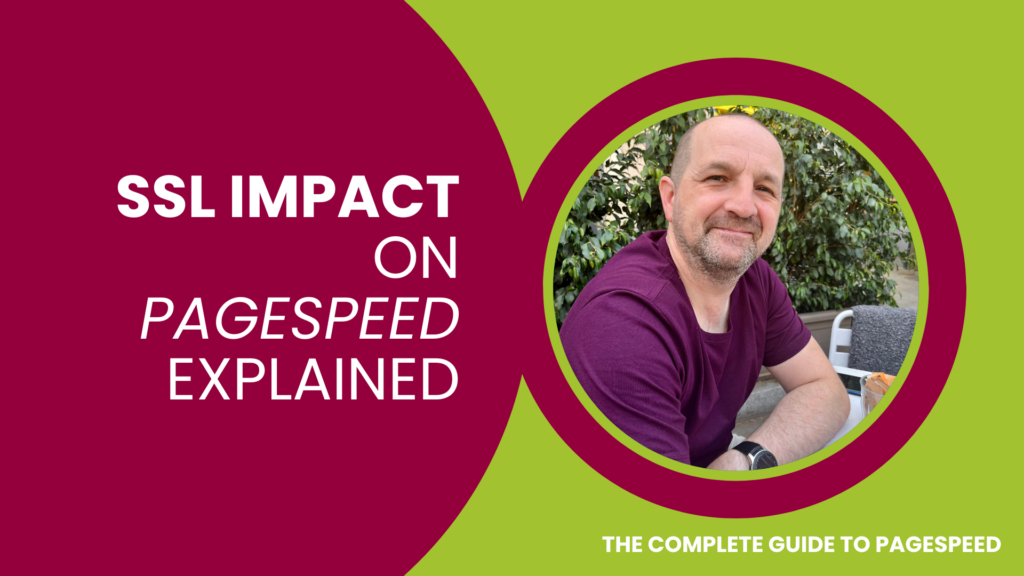SSL (Secure Sockets Layer) is a security protocol that encrypts data sent between a user’s browser and a web server. In other words, SSL helps protect sensitive information (like passwords, credit card numbers, or personal data) from being intercepted by hackers or other third parties.
When a website uses SSL, it’s typically indicated by a small padlock icon next to the website’s URL in the browser’s address bar, as well as a change from “http” to “https” in the URL itself.
Table of contents
The Impact of SSL on Page Speed
So, what impact does SSL have on page speed? There are a few different factors to consider.
First, because SSL involves encrypting data, it can add some additional processing time to each request made to a server. This means that a website that uses SSL may be slightly slower than a website that doesn’t, all other things being equal.
However, the impact of SSL on page speed is generally considered to be minimal, especially when compared to the benefits of using SSL for security and trust.
In fact, some studies have shown that websites with SSL actually load faster than non-SSL websites in certain cases. This is because SSL can help reduce the number of round trips needed between a browser and a server, especially when combined with other optimisation techniques like HTTP/2 or caching.
Imagine that you’re sending a secret message to a friend, and you want to make sure that nobody else can read it. You might use a code or encryption to protect the message, which takes a little bit of extra time and effort, but ensures that the message remains secure.
Similarly, when a website uses SSL, it takes a little bit of extra time and effort to encrypt data and send it securely between a browser and a server. But just like with the secret message, the extra time and effort is worth it to ensure that sensitive information remains safe and secure.
So, while SSL may have a small impact on page speed, the benefits of using SSL for security and trust are generally considered to outweigh any minor performance impact. In fact, many website owners and developers consider SSL to be a crucial component of any modern website, especially in today’s increasingly security-conscious online landscape.
Studies on SSL vs Page Speed
There have been several studies conducted over the years on the impact of SSL on page speed, and the results can vary depending on a number of factors. Here are a few examples of studies that have shown that SSL can actually improve page speed in some cases:
In 2014, Google announced that it would begin using HTTPS (the secure version of HTTP, which uses SSL) as a ranking signal in its search algorithm. According to Google’s own research, HTTPS has a negligible impact on page speed, with an average increase of just 0.1 seconds in latency.
In 2017, a study by HTTP Archive found that HTTPS sites actually loaded slightly faster than non-HTTPS sites, with an average load time of 5.7 seconds compared to 6.0 seconds for non-HTTPS sites.
SSL Impact on Server Response Time
SSL can impact server response time to some extent. The encryption/decryption process that SSL requires can add some overhead to server response times, particularly for high-traffic websites or those with less powerful servers.
How SSL Impacts Mobile Website Performance
SSL can impact mobile website performance in much the same way as desktop website performance. However, since mobile devices may have slower or less reliable internet connections than desktops, the performance impact of SSL may be more noticeable on mobile devices.
How To Check If Your SSL Certificate is Slowing Down Your Site
There are several tools and techniques you can use to diagnose SSL-related performance issues, such as using a website speed testing tool that can break down page load times by component or checking server response times directly.
Here are some tools you can try:
Full list here: 8 Awesome Page Speed Testing Tools
- WebPageTest – This free online tool can provide detailed information about your website’s performance, including SSL performance. WebPageTest can help you identify any SSL-related performance issues and provide recommendations for improvement.
- GTmetrix – Another free online tool that can help you diagnose SSL-related performance issues. GTmetrix provides a detailed breakdown of your website’s performance and can help you identify any issues related to SSL.
- SSL Labs – This free online tool can provide an in-depth analysis of your SSL certificate and server settings. SSL Labs can help you identify any configuration issues that may be impacting SSL performance.
- Pingdom – This online performance monitoring tool offers a range of features, including SSL monitoring and performance testing. Pingdom can help you identify any SSL-related issues and provide recommendations for improvement.
SSL Impact on Website Caching and CDN Performance
SSL can impact website caching and CDN performance to some extent. HTTPS requests may take slightly longer to process than HTTP requests, and some CDNs may require additional configuration to properly handle HTTPS requests.
How to Optimise Your SSL Configuration to Improve Page Speed
SSL configuration can be optimised to improve page speed in several ways. Here are a few techniques that can help:
Web Server Configuration
Most web servers (such as Apache, Nginx, and IIS) have built-in support for SSL and include configuration options for SSL settings. Web server configuration files (such as Apache’s httpd.conf or Nginx’s nginx.conf) can be modified to adjust SSL settings.
Using the latest SSL/TLS protocols (such as TLS 1.3) can help to improve SSL performance by reducing the number of round-trips required for SSL handshakes.
Enable Session Resumption
Session resumption allows SSL sessions to be resumed with a reduced handshake process, which can help to improve SSL performance. Enabling session resumption can be done by configuring SSL session caching on the server.
Minimise the Number of SSL Handshakes Required
SSL handshakes can add significant overhead to page load times, so minimising the number of handshakes required can help to improve SSL performance. Techniques such as HTTP/2 multiplexing and Keep-Alive connections can help to reduce the number of handshakes required.
Use HTTP/2
HTTP/2 is a newer version of the HTTP protocol that includes built-in support for SSL. Using HTTP/2 can help to improve SSL performance by reducing the number of requests required and allowing for multiplexing of requests.
These are just a few examples of techniques that can be used to optimise SSL configuration for better performance. The specific techniques which are most effective will depend on the specific website and server configuration. It’s recommended to consult with a Page Speed Specialist or server administrator to ensure proper SSL optimisation.
Optimise SSL Certificate Settings
Properly configuring SSL certificate settings, such as the key size and signature algorithm, can help to improve SSL performance. Choosing a high-quality SSL certificate can also help to ensure optimal SSL performance.
Where to Buy an SSL Certificate
There are many SSL certificate providers on the market, and the choice of provider can depend on your specific needs and budget. Here are some of the most popular and reputable SSL certificate providers:
- DigiCert – DigiCert is one of the largest SSL certificate providers and offers a wide range of SSL certificates, including EV, OV, and DV certificates. They are known for their high-quality certificates and excellent customer support.
- Sectigo – Sectigo (formerly Comodo) is another popular SSL certificate provider that offers a range of SSL certificates, including EV, OV, and DV certificates. They offer competitive pricing and are known for their user-friendly management portal.
- GlobalSign – GlobalSign is a well-established SSL certificate provider that offers a range of SSL certificates, including EV, OV, and DV certificates. They are known for their fast issuance times and user-friendly management portal.
- GeoTrust – GeoTrust is a popular SSL certificate provider that offers a range of SSL certificates, including EV, OV, and DV certificates. They are known for their competitive pricing and strong customer support.
- Let’s Encrypt – Let’s Encrypt is a free, automated, and open SSL certificate authority that provides DV SSL certificates. They are a good option for websites on a budget, and their certificates are widely accepted by browsers.
When choosing an SSL certificate provider, it’s important to consider factors such as the type of certificate you need, the level of customer support you require, and your budget. It’s also a good idea to check reviews and ratings of SSL certificate providers to ensure that you’re choosing a reputable and reliable provider.
Use a Content Delivery Network (CDN)
A CDN can help to improve SSL performance by caching SSL content at edge locations and reducing the distance that SSL requests need to travel.
This post is part of: Page Speed Optimisation: A Complete Guide — created by our Page Speed Optimisation Specialists.
In this series:







